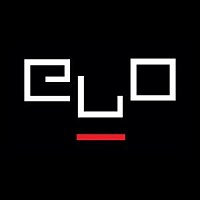Electronic literature or digital literature is a genre of literature where digital capabilities such as interactivity, multimodality or algorithmic text generation are used aesthetically. Works of electronic literature are usually intended to be read on digital devices, such as computers, tablets, and mobile phones. They cannot be easily printed, or cannot be printed at all, because elements crucial to the work cannot be carried over onto a printed version.
Stuart Moulthrop is an innovator of electronic literature and hypertext fiction, both as a theoretician and as a writer. He is author of the hypertext fiction works Victory Garden (1992), which was on the front-page of the New York Times Book Review in 1993, Reagan Library (1999), and Hegirascope (1995), amongst many others. Moulthrop is currently a Professor of Digital Humanities in the Department of English, at the University of Wisconsin–Milwaukee. He also became a founding board member of the Electronic Literature Organization in 1999.

Nick Montfort is a poet and professor of digital media at MIT, where he directs a lab called The Trope Tank. He also holds a part-time position at the University of Bergen where he leads a node on computational narrative systems at the Center for Digital Narrative. Among his publications are seven books of computer-generated literature and six books from the MIT Press, several of which are collaborations. His work also includes digital projects, many of them in the form of short programs. He lives in New York City.
Brian Kim Stefans is an American poet known for his work in experimental poetry and electronic literature. He is a professor of poetry, new media and screenplay studies in the English department of UCLA.
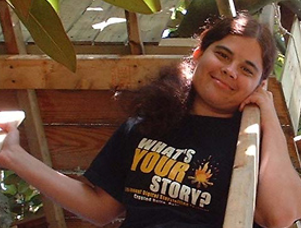
Deena Larsen is an American new media and hypertext fiction author involved in the creative electronic writing community since the 1980s. Her work has been published in online journals such as the Iowa Review Web, Cauldron and Net, frAme, inFLECT, and Blue Moon Review. Since May 2007, the Deena Larsen Collection of early electronic literature has been housed at the Maryland Institute for Technology in the Humanities.
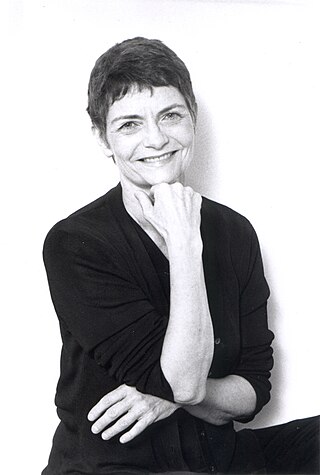
Stephanie Strickland is a poet living in New York City. She has published ten volumes of print poetry and co-authored twelve digital poems. Her files and papers are being collected by the David M. Rubenstein Rare Book And Manuscript Library at Duke University.

María Mencía is a Spanish-born media artist and researcher working as a Senior Lecturer at Kingston University in London, United Kingdom. Her artistic work is widely recognized in the field of electronic literature, and her scholarship on digital textuality has been widely published. She holds a Ph.D. in Digital Poetics and Digital Art at the Chelsea College of Arts of the University of the Arts London and studied English Philology at the Complutense University of Madrid.
Marjorie Coverley Luesebrink was an American writer, scholar, and teacher. Writing hypermedia fiction under the pen name M.D. Coverley, she is best known for her epic hypertext novels Califia (2000) and Egypt: The Book of Going Forth by Day (2006). A pioneer born-digital writer, she is part of the first generation of electronic literature authors that arose in the 1987–1997 period. She was a founding board member and past president of the Electronic Literature Organization and the first winner of the Electronic Literature Organization Career Achievement Award, which was named in her honor. Lusebrink was professor emeritus, School of Humanities and Languages at Irvine Valley College (IVC).
New Binary Press was an independent publishing house founded in 2012 in Cork city, Ireland. In a Tweet dated 19 January 2021, the New Binary Press announced that it had ceased operations. It published print books and electronic literature, specialising in more experimental works, as well as a number of periodicals. It was established and run by its editor, James O'Sullivan.
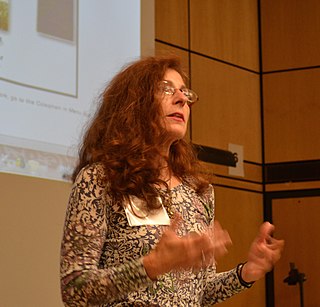
Dene (Rudyne)Grigar is a digital artist and scholar based in Vancouver, Washington. She was the President of the Electronic Literature Organization from 2013 to 2019. In 2016, Grigar received the International Digital Media and Arts Association's Lifetime Achievement Award.
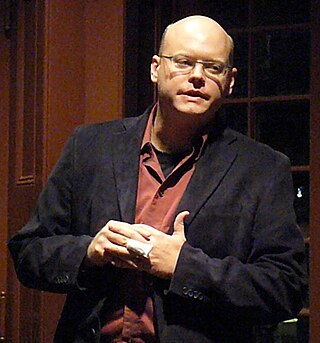
Scott Rettberg is an American digital artist and scholar of electronic literature based in Bergen, Norway. He is the co-founder and served as the first executive director of the Electronic Literature Organization. He leads the Center for Digital Narrative, a Norwegian Centre of Research Excellence from 2023 to 2033.
Tina Escaja, also known as Alm@ Pérez, is a Spanish-American writer, activist, feminist scholar and digital artist based in Burlington, Vermont. She is a Distinguished Professor of Romance Languages and Gender & Women's Studies, and the Director of the Gender, Sexuality and Women's Studies Program at the University of Vermont. She is the winner of the International Poetry Prize Dulce María Loynaz, and the National Latino Poetry Award for Young Adults, Isabel Campoy-Alma Flor Ada. She is considered a pioneer in the field of electronic literature in Spanish. She is a full member of the North American Academy of the Spanish Language (ANLE), and Corresponding member of the Royal Spanish Academy (RAE).
David Jhave Johnston is a Canadian poet, videographer, and motion graphics artist working chiefly in digital and computational media,. and a researcher at the Center for Digital Narrative at the University of Bergen. This artist's work is often attributed, simply, to the name Jhave.
Richard Holeton is an American writer and higher-education administrator. Holeton's creative works are foundational in the hypertext and electronic literature genres. As a writer, his most notable work is the hypertext novel Figurski at Findhorn on Acid, which has been recognized as an important early work of electronic literature and is included in the hypertext canon.
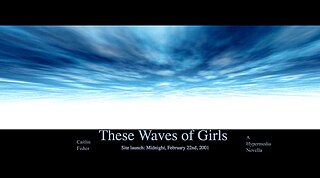
These Waves of Girls is a hypermedia novella by Caitlin Fisher that won the Electronic Literature Organization's Award for Fiction in 2001. The work is frequently taught in undergraduate literature courses and is referenced in the field of electronic literature as a significant example of early multimodal web-based hypertext fiction, placing Fisher "at the forefront of digital writing".
Lexia to Perplexia is a poetic work of electronic literature published on the web by Talan Memmott in 2000. The work won the trAce/Alt-X New Media Writing Award that year.
Light-Water: a Mosaic of Meditations is a "hypermedia work" that utilizes and layers images and poetry to "create a striking experince of poetic meditation." Created by Christy Sheffield Sanford in 1999, the work consists of ten poems that produce a "visual-literal meditation on light and water." Through the implementation of timelines within the poems and overall work, Light-Water illustrates how "space-time possibilities for literature can now be more adequately realized through the use of spatio-temporal dhtml editors."
Caitlin Fisher is a Canadian media artist, poet, writer, and Professor of Cinema and Media Arts at York University in Toronto where she also directs the Immersive Storytelling Lab and the Augmented Reality Lab. Fisher is also a Co-founder of York’s Future Cinema Lab, former Fulbright and Canada Research Chair and an international award-winning digital storyteller. Creator of some of the world’s first AR poetry and long-from VR narratives. Fisher is also known for the 2001 hypermedia novel These Waves of Girls, and for her work creating content and software for augmented reality.
The NEXT: Museum, Library, and Preservation Space is a repository of net art, electronic literature and games. It is supported by the Electronic Literature Lab, Washington State University at Vancouver and the Electronic Literature Organization. This is a digital museum dedicated to reviving and maintaining these works to make them accessible to all. Physical artifacts are held at the Electronic Literature Lab in Washington, US.
